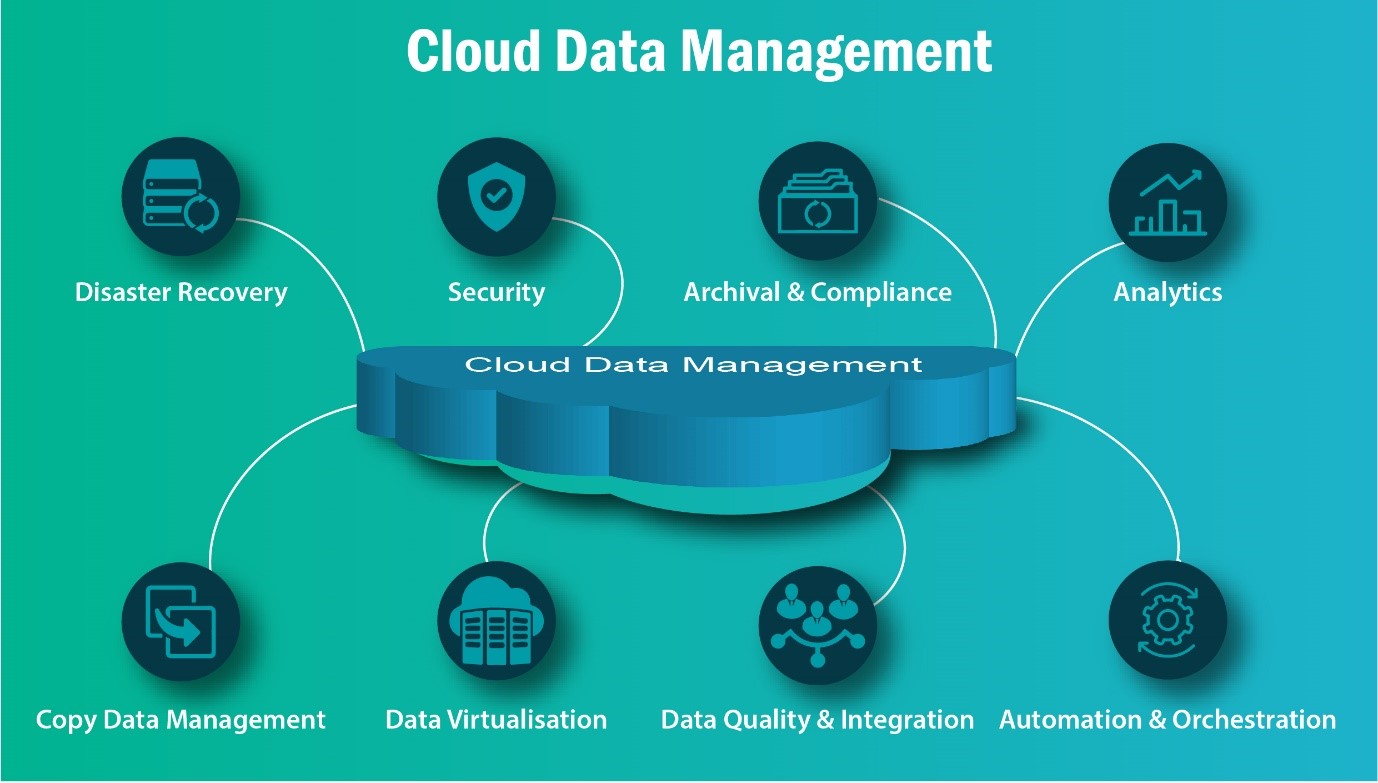Certainly! A detailed list of the best cloud data management companies can be seen below. I’ll give information on some of the top businesses in this sector as of the knowledge cutoff date of September 2021. Before making any judgements, keep in mind that the rankings and specifics may have changed since then. Accordingly, I suggest examining the most recent data and evaluations.
Top Cloud Data Management Companies
1. AWS, or Amazon Web Services
AWS is an Amazon company that offers on-demand cloud computing platforms and APIs to people, businesses, and governments. It provides several different cloud services, such as database management, analytics, and data storage.
Key Services: AWS Glue (ETL Service), Amazon DynamoDB (NoSQL Database), Amazon S3 (Simple Storage Service), Amazon RDS (Relational Database Service), Amazon Redshift (Data Warehousing), and more.
Strengths: A wide range of services are offered, a solid infrastructure is in place, there are many data centers across the world, and other AWS services are integrated.
2. Azure by Microsoft
Overview: Microsoft Azure is a platform for cloud computing that offers a range of cloud services, such as those for analytics, computation, storage, and networking.
Azure SQL Database, Azure Cosmos DB (NoSQL Database), Azure Data Factory (Data Integration), Azure Blob Storage, Azure Synapse Analytics (formerly SQL Data Warehouse), and more are among the company’s key offerings.
Strong enterprise presence, Microsoft product integration, hybrid cloud solutions, and a developing ecosystem of services are its strong points.
3. Google Cloud Platform
The Google Cloud Platform is a collection of cloud computing services that use the same internal infrastructure as Google’s end-user applications.
Key Services: Google Cloud Bigtable (NoSQL Database), Google Cloud Storage, Google Cloud Dataflow (Data Processing), Google Cloud BigQuery (Data Warehousing), Google Cloud Pub/Sub (Messaging), and more.
Strengths include Google’s extensive network infrastructure, machine learning capabilities, and excellent security features.
4. IBM Cloud
Overview: Through public, private, and hybrid cloud delivery modes, IBM Cloud delivers a variety of cloud computing services, including infrastructure as a service (IaaS), platform as a service (PaaS), and software as a service (SaaS).
IBM Db2, IBM Cloud Object Storage, IBM Watson Studio (for AI and machine learning), IBM Cloud Pak for Data (Data Management Platform), and more are some of the key services offered.
Strong enterprise emphasis, analytics and AI capabilities, hybrid cloud options, and support for open standards are strengths.
5. Fifth Snowflake
Overview: Snowflake is a cloud-based data warehousing startup that gives businesses access to enormous amounts of structured and semi-structured data for storing, processing, and analysis.
Snowflake Cloud Data Platform, Snowflake Data Marketplace, Snowflake Data Sharing, and more are some of the key services offered.
Strengths include elastic scaling, separating computation from storage, supporting different cloud providers, and emphasising data sharing and collaboration.
6. Databricks
Overview: Using Apache Spark, Databricks offers a unified analytics platform that assists businesses in handling, storing, and processing huge amounts of data.
The main services are Databricks Unified Analytics Platform, Databricks SQL Analytics, Databricks Machine Learning, and others.
Strengths include knowledge of Apache Spark, collaborative features, support for both batch and real-time processing, and excellent data engineering skills.
7. Informatica
Overview: Organisations can manage and optimise their data with Informatica’s full range of cloud data management and integration solutions.
Important Services: Informatica MDM (Master Data Management), Informatica Cloud Data Integration, Informatica Cloud Data Quality, Informatica Intelligent Cloud Services, and more.
Strengths include support for multi-cloud and hybrid settings, data integration and quality capabilities, and a concentration on data governance and compliance.
8. Oracle Cloud
Overview: Database, analytics, and data management solutions are among the cloud services offered by Oracle Cloud.
Oracle Exadata Cloud Service, Oracle Autonomous Database, Oracle Cloud Infrastructure (OCI), Oracle Data Integrator (ODI), and other key offerings.
Strengths: A focus on enterprise customers, strong database options, and autonomous capabilities.
9. Talend
With Talend’s data integration and data integrity solutions, businesses can connect, transform, and purify their data.
Talend Data Integration, Talend Cloud, Talend Data Fabric, Talend Big Data Integration, and more are some of the company’s key services.
Strengths include a wide variety of connectors, support for data integration across on-premises and cloud settings, and open-source foundations.
10. Cloudera
Overview: With the help of Cloudera, businesses can manage and analyze data across hybrid and multi-cloud systems.
Cloudera Data Platform (CDP), Cloudera Data Warehouse, Cloudera Data Engineering, Cloudera Machine Learning, and others are among the company’s key offerings.
Strengths: Concentration on big data and analytics; assistance with hybrid and multi-cloud implementations; and proficiency with Hadoop and associated technologies.
11. Teradata
Overview: Teradata delivers data warehousing, analytics, and consulting services through a cloud-based data analytics platform.
Teradata Vantage, Teradata QueryGrid, Teradata IntelliCloud, Teradata Data Lake, and more are some of the company’s key offerings.
Strengths: Solid analytics skills, data warehousing know-how, and a commitment to providing useful information.
12. NetApp
Overview: NetApp offers cloud data management solutions that assist businesses in storing, controlling, and safeguarding their data.
Key Products: Cloud Volumes ONTAP, Cloud Insights, Cloud Backup, and more from NetApp.
Strengths: Expertise in data storage, cloud-native solutions, and an emphasis on disaster recovery and data security.
13. Couchbase
Overview: The NoSQL database platform Couchbase offers scalable, flexible, and high-performance data management solutions.
Key products include Couchbase Mobile, Couchbase Cloud, and Couchbase Server.
Strengths include support for mobile and online apps, NoSQL database functionality, and a concentration on scalability and performance.
14. MongoDB
Overview: MongoDB is a well-known NoSQL database technology that offers adaptability, scalability, and developer-friendliness.
MongoDB Atlas, MongoDB Cloud, MongoDB Realm, and other key offerings.
Strengths: A large developer community, a document-oriented database format, and cloud-native solutions.
15. Informatica
Overview: Informatica is a pioneer in connecting and managing data in the cloud, assisting organizations.
Informatica Cloud Data Quality, Informatica Cloud Data Integration, Informatica MDM (Master Data Management), and other key offerings.
Strengths include robust data quality features, broad data integration capabilities, and a focus on data governance and compliance.
16. Denodo
Overview: Denodo provides a platform for data virtualization that enables businesses to combine data from diverse sources.
Key services include Denodo Cloud, Denodo Data Virtualization, and others.
Strengths include the ability to virtualize data, support for real-time data access, and an emphasis on data integration and agility.
17. SAP
Overview: SAP offers a variety of cloud data management and analytics solutions to assist businesses in gaining insights from their data.
SAP HANA, SAP Data Intelligence, SAP Cloud Platform, and other key offerings.
Strengths include interaction with SAP applications, powerful analytics capabilities, and in-memory database capabilities.
18. Alteryx
An overview of the platform offered by Alteryx for advanced analytics, data blending, and data preparation.
Alteryx Designer, Alteryx Server, Alteryx Analytics Hub, and other key offerings.
Strengths: Data preparation tools, self-service analytics capabilities, and an emphasis on empowering business users.
19. Qlik
Overview: Qlik provides a platform for data analytics that enables businesses to see and investigate their data.
Qlik Sense, QlikView, Qlik Analytics Platform, and other key offerings.
Possibilities for data visualization, self-service analytics, and an emphasis on user-friendly interfaces are strengths.
20. Talend
Overview: Talend offers data connectivity, data transformation, and data cleaning solutions to assist organizations.
Talend Data Integration, Talend Cloud, Talend Data Fabric, and other key offerings.
Strengths include a large variety of connections, support for hybrid and multi-cloud settings, and open-source foundations.
Please take note that new firms may have entered the cloud data management market since my knowledge cutoff date, and the rankings and detailed information may have changed. When assessing cloud data management solutions for your particular needs, always undertake in-depth research and take into account the most recent testimonials, client comments, and market trends.
FAQ
1. What are organizations that manage cloud data and what do they do?
Solutions for storing, processing, analyzing, and managing data on the cloud are offered by cloud data management firms. To assist businesses in making the most of their data, they provide a variety of services, including data storage, integration, analytics, and more.
2. Why should I think about working with a cloud data management firm?
Scalability, cost-effectiveness, flexibility, and access to advanced analytics and data processing skills are just a few advantages that cloud data management firms may provide. They make it possible for businesses to use cloud resources to meet their data needs.
3. Which businesses offer the best cloud data management services?
Amazon Web Services (AWS), Microsoft Azure, Google Cloud Platform (GCP), Snowflake, IBM Cloud, and many others are among the top providers of cloud data management services. Your individual needs, including data volume, analytics requirements, industry, and budget, will determine which business is best for
4. What aspects should I take into account when selecting a cloud data management provider?
Consider factors such as the company’s service offerings, scalability, pricing, data security, integration capabilities, support for your preferred cloud platforms, and the specific features that align with your data management goals.
5. Are there any particular sectors or use cases where cloud data management is especially advantageous?
Cloud data management is beneficial across various industries, including e-commerce, healthcare, finance, marketing, and more. Businesses that manage a lot of data, need real-time analytics or need to scale quickly can benefit the most from it.
6. How can I calculate how much using a cloud data management firm will cost?
Pricing models vary among companies and services. Common factors that influence cost include the amount of data stored, data processing and analytics requirements, the number of users accessing the platform, and any additional features or support you may need.
7. Can I combine the services of several cloud data management providers?
Yes, it is possible to combine several cloud data management solutions. Many organizations adopt a multi-cloud or hybrid cloud strategy, leveraging the strengths of different providers to optimize their data management and analytics capabilities.
8. Do I need technical expertise to use cloud data management services?
It depends on the specific service and your requirements. Some cloud data management platforms offer user-friendly interfaces or no-code/low-code options, making them accessible to a broader audience. However, having technical expertise can be beneficial for optimising complex workflows and integrations.
9. How do I ensure data security and compliance when using cloud data management services?
Look for companies that offer robust data security measures, compliance certifications, encryption, access controls, and data governance features. It’s essential to understand the security practises of the company and ensure they align with your industry’s regulatory requirements.
10. Is it possible to migrate my existing data to a cloud data management solution?
Yes, many cloud data management companies offer data migration tools and services to help you move your existing data to their platform. Proper planning and execution are essential to ensuring a smooth transition without data loss or downtime.

